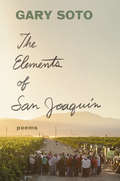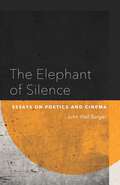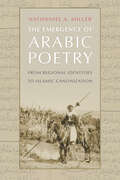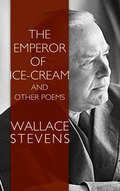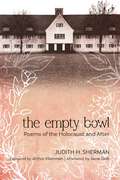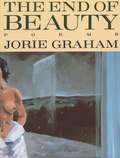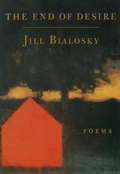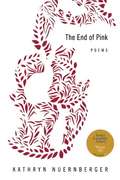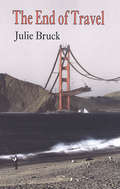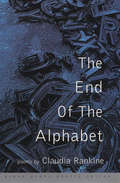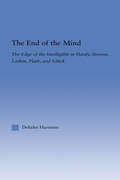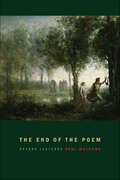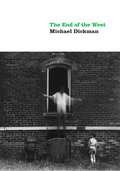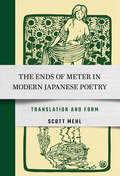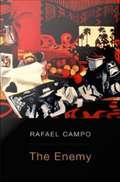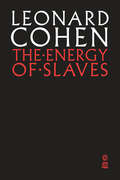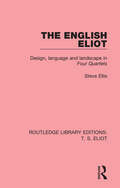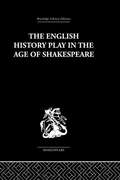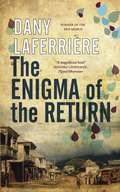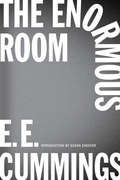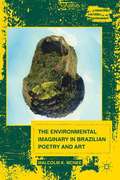- Table View
- List View
The Electric Life: Essays on Modern Poetry
by Sven P. Birkerts Maria D. GuarnaschelliAlert to the genuine, wary of pose and pretension, Birkerts guides us through the shoals and depths of contemporary verse as he spotlights a score of less well-known poets, among them Alice Fulton, Frank Bidart, Jorie Graham, Peter Klappert, Melissa Green. His close readings of Keats and Marianne Moore remind us why we still turn to their poetry.
The Elements of San Joaquin
by Gary SotoA timely new edition of a pioneering work in Latino literature, National Book Award nominee Gary Soto's first collection (originally published in 1977) draws on California's fertile San Joaquin Valley, the people, the place, and the hard agricultural work done there by immigrants. In these poems, joy and anger, violence and hope are placed in both the metaphorical and very real circumstances of the Valley. Rooted in personal experiences—of the poet as a young man, his friends, family, and neighbors—the poems are spare but expansive, with Soto's voice as important as ever. This welcome new edition has been expanded with a crucial selection of complementary poems (some previously unpublished) and a new introduction by the author.
The Elephant of Silence: Essays on Poetics and Cinema
by John Wall Barger“A poem is an act of faith because the poet believes in it,” contends John Wall Barger in The Elephant of Silence, a collection of essays exploring forms of knowing (and not knowing) that awaken a poetic mind. By considering poetry, film, and the intersections among aesthetic moments and our lives, Barger illuminates the foundations of poetic craft but also probes how to be alive, creative, and open in the world. Each piece investigates unanswerable questions and indefinable words: Lorca’s duende, Nabokov’s poshlost, Bashō’s underglimmer, Huizinga’s ludic, Tarkovsky’s Zona. Influenced by poets such as Glück and Ruefle, and filmmakers such as Kubrick and Lynch, Barger writes—first always sharing his own personal life stories—on the nature of perception, experience, and the human mind. With lyric eloquence and disarming candor, The Elephant of Silence tackles how to live an imaginative life, how to gravitate toward the silence from which art comes, and how the mystical is also the everyday.
The Emergence of Arabic Poetry: From Regional Identities to Islamic Canonization
by Nathaniel A. MillerA new literary history of Arabic poetry from 500–750 CE that includes hundreds of lines of poetry never before translated into EnglishTo interpret the Quran’s Arabic, early medieval Muslims turned to pre-Islamic poetry, a corpus that the Prophet Muhammad’s cousin called “the archive of the Arabs.” While this principle seems straightforward, pre-Islamic Arabs did not, in fact, think of themselves as either pre-Islamic or Arab. The term Arab barely appears at all in pre-Islamic poetry.The Emergence of Arabic Poetry reexamines this early poetry to reconstruct what pre-Islamic culture actually entailed. Nathaniel A. Miller draws on a wide range of texts, including hundreds of lines of poetry never before translated into English—in addition to new inscriptional, archaeological, and non-Arabic sources—to explore the diverse world of pre- and early-Islamic Arabia in which Islam developed. Miller traces the emergence of two regional identities, and their distinctive poetic traditions, in the Arabian Peninsula of late antiquity: Najdi in the center and northeast and Hijazi in the southwest. The book shows how later efforts of Muslim scholars to use early poetry as an aesthetic, linguistic ideal to interpret the Quran resulted in an image of a unitary, exceptional, and isolated Arab identity and culture. These scholars drew on the Najdi tradition, canonizing its forms as classical Arabic poetry par excellence, and solidifying many tropes of Arabness that are still ubiquitous today: of nomadism, performative generosity, and martial equestrianism. However, Miller argues, it was the neglected Hijazi tradition that was actually more central to the emergence of early Islam.Early Arabic poetry has been largely overlooked in current scholarship in adjacent fields, largely due to twentieth-century controversies over whether this corpus is legitimate or was forged. In combining a reconstruction of pre-Islamic poetry’s social function with a consideration of the circumstances of its later canonization, The Emergence of Arabic Poetry offers an urgently needed reappraisal of a significant but underexamined poetic corpus, as well as a new literary history of the origins of Arabic poetry from 500 to 750 CE.
The Emperor of Ice-Cream and Other Poems
by Wallace Stevens Bob BlaisdellAn insurance company executive with a law degree, Wallace Stevens (1879-1951) lived an outwardly conventional life but composed highly original and exotic works of verse. One of America's most important twentieth-century poets, Stevens forever changed the landscape of modern poetry with his provocative, experimental style.This first-rate collection by the winner of the 1955 Pulitzer Prize for poetry invites students and other readers to enjoy the richness and variety found in 82 of Stevens's finest creations. Included are such well-known compositions as "Sunday Morning," "Disillusionment of Ten O'Clock," "Anecdote of the Jar," "Peter Quince at the Clavier," "Thirteen Ways of Looking at a Blackbird," and the title piece -- the author's favorite -- as well as lesser known yet equally stimulating works such as "The Florist Wears Knee-Breeches" and "The Man Whose Pharynx Was Bad."Invaluable to students of American literature, this volume will be an indispensable treasury for lovers of modern poetry.
The Empty Bowl: Poems of the Holocaust and After
by Judith H. ShermanIn The Empty Bowl: Poems of the Holocaust and After, Holocaust survivor Judith H. Sherman strives to record trauma through art. Her poems, written largely in the words of a fifteen-year-old survivor, provide historical entry into the Holocaust. Put simply, the poems explore the reality of the events experienced by Sherman in her determination to survive—from first leaving home to illegal border crossings, hiding, capture, imprisonment by the Gestapo, the horrors of the Ravensbrück concentration camp, liberation, and, finally, a full life of joys and challenges that came after, including the unyielding intrusions of the past and hopeful celebration of a compassionate future.
The Enchanted Dust
by Pratibha Satpathy Raju SamalThe poems in this collection depict the spiritual experiences of the poet. They concern human existence, which according to Satpathy is like a grain of ordinary dust enchanted with magical powers.
The End of Beauty (The American Poetry Series; v. #33)
by Jorie GrahamThis book is a collection of poems with a metaphysical flair and emotional power by Ms. Graham.
The End of Desire
by Jill BialoskyJill Bialosky's first collection of poems is an exceptional one--moving, very accomplished, marked by an unflinching realism and a sharply observant eye combined with great technical skill. Childhood and adolescence shattered by a father's death and the struggles of a mother to raise her daughters are among its concerns. The poems have a dignity and magic that are quite distinctive.
The End of Pink (American Poets Continuum)
by Kathryn NuernbergerWinner of the 2015 James Laughlin Award, Kathryn Nuernberger's The End of Pink is populated by strange characters—Bat Boy, automatons, taxidermied mermaids, snake oil salesmen, and Benjamin Franklin—all from the annals of science and pseudoscience. Equal parts fact and folklore, these poems look to the marvelous and the weird for a way to understand childbirth, parenthood, sickness, death, and-of course—joy.
The End of Travel
by Julie BruckWith crisp, elegant language, sharp wit and resonant images, Julie Bruck's new book gentles the largesse of life out of its many smallnesses. The way a straw buoys up in a can of pop, or a friend’s dress holds her shape, even on its hanger: Bruck textures her poetry with a life "you could close your hand around." Bruck's is the urban world so many of us walk through, eyes closed. But Bruck's eyes are wide open, keen and collecting. With teeth and heart, she cracks open the ordinary to reveal life’s love and loss, joy and fragility, its extraordinary fullness.
The End of the Alphabet: Poems
by Claudia RankineThese poems—intrepid, obsessive, and erotic—tell the story of a woman's attempt to overcome despair. Claudia Rankine, whose first collection was the prize-winning Nothing in Nature is Private, creates a transfixing testimonial to a woman facing her own disease. Drawing on voices from Jane Eyre to Lady MacBeth, Rankine welds the cerebral and the spiritual, the sensual and the grotesque, courting paradox into the center of her voice.
The End of the Mind: The Edge of the Intelligible in Hardy, Stevens, Larking, Plath, and Gluck (Literary Criticism and Cultural Theory)
by DeSales HarrisonFirst Published in 2005. Routledge is an imprint of Taylor & Francis, an informa company.
The End of the Poem: Oxford Lectures
by Paul MuldoonIn The End of the Poem, Paul Muldoon, "the most significant English-language poet born since the Second World War" (The Times Literary Supplement), presents engaging, rigorous, and insightful explorations of a diverse group of poems, from Yeats's "All Souls' Night" to Stevie Smith's "I Remember" to Fernando Pessoa's "Autopsychography." Here Muldoon reminds us that the word "poem" comes, via French, from the Latin and Greek: "a thing made or created." He asks: Can a poem ever be a freestanding, discrete structure, or must it always interface with the whole of its author's bibliography—and biography? Muldoon explores the boundlessness, the illimitability, created by influence, what Robert Frost meant when he insisted that "the way to read a poem in prose or verse is in the light of all the other poems ever written." And he writes of the boundaries or borders between writer and reader and the extent to which one determines the role of the other.At the end, Muldoon returns to the most fruitful, and fraught, aspect of the phrase "the end of the poem": the interpretation that centers on the "aim" or "function" of a poem, and the question of whether or not the end of the poem is the beginning of criticism. Irreverent, deeply learned, often funny, and always stimulating, The End of the Poem is a vigorous and accessible approach to looking at poetry anew.
The End of the West
by Michael Dickman"Dickman's book moves with careful intensity as it confidently illuminates buried, contemporary suffering."--Publishers Weekly"Elizabeth Bishop said that the three qualities she admired most in poetry were accuracy, spontaneity, and mystery. Michael Dickman's first full-length collection of poems demonstrates each brilliantly....These are lithe, seemingly effortless poems, poems whose strange affective power remains even after several readings. Again and again the language seems to disappear, leaving the reader with woven flashes of image, situation, emotion....These are durable poems from one of the most accomplished and original poets to emerge in years."--The Believer"With vacant space and verbal economy, his work suggests volumes." --Poets & Writers The poems in Michael Dickman's energized debut document the bright desires and all-too-common sufferings of modern times: the churn of domestic violence, spiritual longing, drug abuse, and the impossible expectations fathers have for their sons. In a poem that references heroin and "scary parents," Dickman reminds us that "Still there is a lot to pray to on earth." Dickman is a poet to watch.You can go blind, waitingUnbelievable quietexcept for their soundingsMoving the sea aroundUnbelievable quiet inside you, as they changethe face of waterThe only other time I felt this still was watching Leif shoot up when we were twelveSunlight all over his facebreakingthe surface of somethingI couldn't seeYou can wait yourwhole lifeMichael Dickman was born and raised in Portland, Oregon, and began writing poems "after accidentally reading a Neruda ode." His work has appeared in The New Yorker, Tin House, and The American Poetry Review.
The Ends of Meter in Modern Japanese Poetry: Translation and Form
by Scott MehlIn The Ends of Meter in Modern Japanese Poetry, Scott Mehl analyzes the complex response of Meiji-era Japanese poets and readers to the challenge introduced by European verse and the resulting crisis in Japanese poetry. Amidst fierce competition for literary prestige on the national and international stage, poets and critics at the time recognized that the character of Japanese poetic culture was undergoing a fundamental transformation, and the stakes were high: the future of modern Japanese verse. Mehl documents the creation of new Japanese poetic forms, tracing the first invention of Japanese free verse and its subsequent disappearance. He examines the impact of the acclaimed and reviled shintaishi, a new poetic form invented for translating European-language verse and eventually supplanted by the reintroduction of free verse as a Western import. The Ends of Meter in Modern Japanese Poetry draws on materials written in German, Spanish, English, and French, recreating the global poetry culture within which the most ambitious Meiji-era Japanese poets vied for position.
The Enemy
by Rafael CampoIn his fifth collection of poetry, the physician and award-winning writer Rafael Campo considers what it means to be the enemy in America today. Using the empathetic medium of a poetry grounded in the sentient physical body we all share, he writes of a country endlessly at war-not only against the presumed enemy abroad but also with its own troubled conscience. Yet whether he is addressing the U. S. invasion of Iraq, the battle against the AIDS pandemic, or the culture wars surrounding the issues of feminism and gay marriage, Campo’s compelling poems affirm the notion that hope arises from even the most bitter of conflicts. That hope-manifest here in the Cuban exile’s dream of returning to his homeland, in a dying IV drug user’s wish for humane medical treatment, in a downcast housewife’s desire to express herself meaningfully through art-is that somehow we can be better than ourselves. Through a kaleidoscopic lens of poetic forms, Campo soulfully reveals this greatest of human aspirations as the one sustaining us all.
The Energy of Slaves
by Leonard CohenTo mark the publication of Leonard Cohen's final book, The Flame, McClelland & Stewart is proud to reissue six beautiful editions of Cohen's cherished early works of poetry, many of which are back in print for the first time in decades. A freshly packaged new series for devoted Leonard Cohen fans and those who wish to discover one of the world's most adored and celebrated writers.Originally published by McClelland & Stewart in 1972, The Energy of Slaves is Cohen's fifth collection, and one of his most controversial. A dark and intense book, described by one critic as "deliberately ugly, offensive, bitter, anti-romantic," Cohen considered it a document of his struggle--"I've just written a book called The Energy of Slaves," he told an interviewer at the time, "and in there I say that I'm in pain." Bracing, challenging, and equally beautiful and off-putting, it remains one of his most compelling and complex works.
The English Eliot: Design, Language and Landscape in Four Quartets (Routledge Library Editions: T. S. Eliot #Vol. 3)
by Steve EllisThis book, first published in 1991, supplies a neglected cultural context for T. S. Eliot’s writings of the 1930s and 1940s, particularly Four Quartets, and attempts to disprove the widespread belief in Eliot’s unproblematic commitment to England, and the ‘Englishness’. The book traces Eliot’s classicism not only in linguistic and formalist terms but also in his construction of England in the Quartets and Quartets-related essays. His practice is related to the vigorous polemic concerning the definition of England found in the 1930s and 1940s, in material as diverse as landscape painting, advertising, travel literature and the detective novel. This original and provocative text will not only be of interest to students and teachers of Eliot, but to those interested in representations of nationality.
The English History Play in the age of Shakespeare
by Irving Ribner.First published in 1957. This edition re-issues the second edition of 1965. Recognized as one of the leading books in its field, The English History Play in the Age of Shakespeare presents the most comprehensive account available of the English historical drama from its beginning to the closing of the theatres in 1642 and relates this development to Renaissance historiography and Elizabethan political theory.
The English Writings of Rabindranath Tagore: Volume One, Poems
by Rabindranath Tagore Sisir Kumar DasAlthough Rabindranath Tagore's reputation as a writer outside the Bengali-speaking world rests almost entirely on English translations, no attempt has been made yet to make his English works available to the interested readers. Sahitya Akademi, therefore, thought it extremely important to bring out a definitive edition of Tagore's works in English to project one of the greatest writers of our times, as a writer in English also.
The Enigma of the Return
by Dany Laferrière"An affecting meditation on loss and exile" ANGEL GURRIA-QUINTANA, Financial TimesWindsor Laferrière left Haiti in fear of his life. He has lived in Montreal for thirty-three years, and when his father dies in New York, himself an exile for half a century, Windsor travels there to attend the funeral, and then back to Haiti to inform his mother of the death. In Haiti, Windsor is faced with the grim truth of life in his homeland - the endemic poverty, the thwarted ambitions and broken dreams. But only here can he become a writer again . . .The Enigma of the Return lives where fiction, poetry and autobiography meet. These creative tensions sustain a narrative of astonishing beauty, clarity and insight."Looks set to become one of the great poetic statements of homesickness and return . . . It should be read by all exiles everywhere" Ian Thomson, Independent"A poetic, melancholic tour de force . . . a compelling, intense, stark and poignant exploration of living life as an outsider . . . The great Haitian novel" Jo Lateu, New Internationalist
The Enigma of the Return
by Dany Laferrière"An affecting meditation on loss and exile" ANGEL GURRIA-QUINTANA, Financial TimesWindsor Laferrière left Haiti in fear of his life. He has lived in Montreal for thirty-three years, and when his father dies in New York, himself an exile for half a century, Windsor travels there to attend the funeral, and then back to Haiti to inform his mother of the death. In Haiti, Windsor is faced with the grim truth of life in his homeland - the endemic poverty, the thwarted ambitions and broken dreams. But only here can he become a writer again . . .The Enigma of the Return lives where fiction, poetry and autobiography meet. These creative tensions sustain a narrative of astonishing beauty, clarity and insight."Looks set to become one of the great poetic statements of homesickness and return . . . It should be read by all exiles everywhere" Ian Thomson, Independent"A poetic, melancholic tour de force . . . a compelling, intense, stark and poignant exploration of living life as an outsider . . . The great Haitian novel" Jo Lateu, New Internationalist
The Enormous Room (New Edition)
by E. E. Cummings Susan Cheever George James Firmage"Of all the work by young men who have sprung up since 1920 one book survives--The Enormous Room by E. E. Cummings."--F. Scott Fitzgerald The most notable work of fiction from our most beloved modernist poet, The Enormous Room was one of the greatest--yet still not fully recognized-- American literary works to emerge out of World War I. Drawing on E. E. Cummings's experiences in France as a volunteer ambulance driver, this novel takes us through a series of mishaps that led to the poet's being arrested for treason and imprisoned. Out of this trauma Cummings produced a work like no other--a story of oppression and injustice told with his characteristic linguistic energy and unflappable exuberance, which celebrates the spirit of the individual and offers a brave and brilliant opposition in the face of the inhumanity of war. Illustrated with drawings Cummings made while imprisoned in France and featuring an illuminating new introduction by Susan Cheever, this reissued edition offers a unique and multifaceted lens onto the inner life of the poet in his youth and demands recognition by a twenty-first-century readership.
The Environmental Imaginary In Brazilian Poetry And Art
by Malcolm K. McneeThis study contributes to ongoing discussions on the connections between the environmental imaginary and issues of identity, place and nation. Utilizing a delimited ecocritical approach, McNee puts Brazilian culture, through the work of contemporary poets and visual artists, into a broader, transnational dialogue.

